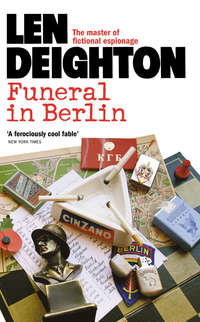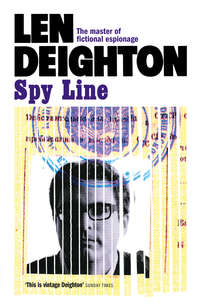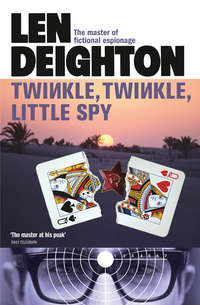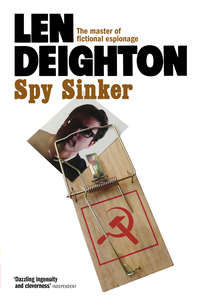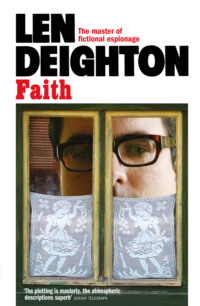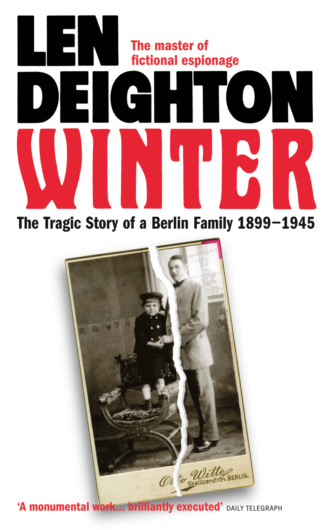
Полная версия
Winter: A Berlin Family, 1899–1945
‘Harry! You poor darling!’ his wife cooed mockingly. She looked lovely when she laughed. Even in hospital, with her long fair hair on her shoulders instead of arranged high upon her head the way her personal maid did it, she was the most beautiful woman he’d ever seen. Her determined jaw and high cheekbones and her tall elegance seemed so American to him that he never got used to the idea that this energetic creature was his wife.
Winter flushed. ‘I’m sorry, darling. I didn’t mean that. Obviously you’ve had a terrible time, too.’
She smiled at his discomfort. It was not easy to disconcert him. ‘I have not had a terrible time, Harry. I’ve had a son.’
Winter glanced at the baby in the cot. ‘I wanted to be here sooner, but there was a complication at the bank this morning. The senior manager came to talk to me while I was shaving. At home, while I was shaving! One of our clients died…. It was suicide.’
‘Oh, how terrible, Harry. Is it someone I know?’
‘A Jew named Petzval. To tell you the truth, I think the fellow was up to no good. The secret police have been interested in him for some time. He might have been a member of one of these terrorist groups.’
‘How do you come to have dealings with such people, darling?’ She lolled her head back and was glazy-eyed. It was, of course, the after effects of the anaesthetic. The nurse had said she was still weak.
‘It was one of the junior managers who dealt with him. Some of them have no judgement at all.’
‘Suicide. Poor tormented soul,’ said Veronica.
Winter watched her cross herself and then glance at the carved crucifix above her bed. He hoped that she was not about to become a Roman Catholic or some sort of religious fanatic. Winter had quite enough to contend with already without a wife going to Mass at the crack of dawn each day. He dismissed the idea. Veronica was not the type; if Veronica became a convert, she was more likely to be a convert to Freud and his absurd psychology. She’d already been to some of Freud’s lectures and refused to laugh at Winter’s jokes about the man’s ideas. ‘It’s a good thing you’re not running the bank, my dearest Veronica. You’d be giving the cash away to any bare-arsed beggar who arrived with a hard-luck story.’ He moved a basket of flowers from a chair – the room was filled with flowers – and noticed from the card that the employees of the Berlin bank had sent them. He sat down.
‘I want to call him Paul,’ said his wife. ‘Do you hate the name Paul?’
‘No, it’s a fine name. But I thought you’d want to name him after your father.’
‘Peter and Paul, darling. Don’t you see how lovely it will be to have two sons named Peter and Paul?’
‘Have you been saving up this idea ever since our son Peter Harald was born, more than three years ago?’
She smiled and stretched her long legs down in the bedclothes. She’d chosen two names her American parents would find equally acceptable. She wondered if Harry realized that. He probably did; Harry Winter was very sharp when it came to people and their motives.
‘All that time?’ said Winter. He laughed. ‘What a mad Yankee wife I have.’
‘You are pleased, Harry? Say you’re pleased.’
‘Of course I am.’
‘Then go and look at him, Harry. Pick him up and bring him to me.’
Winter looked over his shoulder hoping that the nun would return, but there was no sign of her. She was obviously giving them a chance for privacy. Awkwardly he picked up his newly born son. ‘Hello, Paul,’ he said. ‘I have a present for you, child of the new century.’ He was a pudgy little fellow with a screwed-up face that seemed to scowl. But the baby’s eyes were Veronica’s: smoky-grey eyes that never did reveal her innermost thoughts. Winter put the baby back into the cot.
‘Do you really, Harry? How wonderful you are. What is it, darling? Let me see what it is.’
‘It’s a plot of land,’ said Winter. ‘A small piece of hillside on the Obersalzberg.’
‘A plot of land? Where’s Obersalzberg?’
‘Bavaria, Germany, the very south. It’s the sort of place where a man could build himself a comfortable shooting lodge. A place a man could go when he wants to get away from the world.’
‘A plot of land on the Obersalzberg. Harry! You still surprise me, after all this time we’ve been married.’ Through the haze of the ether that was still making her mind reel, she wondered if that represented some deep-felt desire of her husband. Did he yearn to go somewhere and get away from the world? He already had that beastly girl Martha to go to. What else did he want?
‘What’s wrong?’ said Winter.
‘Nothing, darling. But it’s a strange present to give a newborn baby, isn’t it?’
‘It’s good land: a fine place with a view of the mountains. A place for a man to think his own thoughts and be his own master.’ He looked at the baby. It was happier now and managed a smile.
1906

‘The sort of thing they’re told at school’
‘You have two delightful little boys, Veronica,’ said her father. He watched through the window of the morning room as the solemn ten-year-old Peter pushed his radiantly joyful little blond brother across the lawn on a toy horse. The children were in the private gardens of a big house in London’s Belgravia. It was a glorious summer’s day, and London was at its shining best. An old gardener scythed the bright-green grass to make scallop patterns across the lawn. The scent of newly cut grass hung heavily in the still air and made little Pauli’s eyes red and weepy. Cyrus sniffed contentedly. Their English friends urged them to come to London in ‘the season’, but the Rensselaers preferred to cross the Atlantic at this time of year, when the seas were calmer. ‘No matter what I’m inclined to say about that rascally husband of yours, at least he’s given you two fine boys.’
‘Now, now, Papa,’ said Veronica mildly, ‘let’s not go through all that again.’ She was wearing a long ‘tea gown’ of blue chiffon with net over darker-blue satin. Such afternoon gowns gave her a few hours’ escape from the tight corsets that fashion forced her into for most of the day. It was a lovely, loose, flouncy creation that made her feel young and beautiful and able even to take on her parents. She pulled the trailing hem of it close and admired it.
‘She’s given Harry two fine boys,’ Mrs Rensselaer scoffed. ‘Isn’t it just like a man to put it the wrong way around? Who endured that dreadful hospital in Vienna, when there was a bedroom and our own doctor waiting for her in New York City?’ They were getting at her again, but she was used to it by now. She noticed how much stronger her mother’s high-pitched Yankee twang sounded compared with her father’s softly accented low voice. She noticed all the accents much more now that her life was spent amongst Germans. She wondered if her spoken English had now acquired some sort of German edge to it. Her parents had never mentioned it, and she knew better than to ask them.
‘I couldn’t have come home to have the baby, Mother. You know I couldn’t.’ She suppressed a sigh. For six years they’d nursed this resentment, and still it persisted.
Her father watched the children cross the road hand in hand with their nanny and heard the front door as they came in time to have a wash before tea. He said, ‘I travel across the Atlantic regularly, Veronica, and your mother usually accompanies me. It’s ridiculous for you to go on pretending that you can’t come home for a visit when we come here to London every year without fail.’ He thrust his hands into his pockets. ‘By golly, when I first came to Europe, I sailed on a four-masted barque, now your mother and I sleep in state rooms with running water, and eat dinners that wouldn’t disgrace the Ritz.’
Cyrus G. Rensselaer was a distinguished-looking man in his mid-fifties. He had a shock of black hair combed straight back, pale-blue eyes, and a large moustache. He made no concessions to the warm weather: he wore a black barathea morning suit with a fancy brocaded waistcoat, and a loose tie with a silver pin through the knot. Yet there was a certain unconventional look to him – his hair was longer than was fashionable – so that sometimes, on the steamship coming over, fellow passengers thought he might be a famous musician or a successful painter. This always pleased Cyrus Rensselaer because he often said that he would have become a painter had his father not thrashed him every time he wanted to stop studying engineering.
‘I know, Father. You’ve told me all that in your letters. But Harry is a German; the boys are German. I think of Germany as my home now.’ The difficulty was that her parents spoke no foreign languages, and their one visit to Berlin for the wedding in 1892 seemed to have deterred both of them from ever going to the continent of Europe again.
‘You were able to go to Vienna and have the baby, darling,’ explained her mother. ‘Papa feels that coming back to New York wouldn’t have been all that much more of a strain.’
‘The baby was early, Mother. We were in Vienna and the doctor said I shouldn’t travel.’ She looked at her parents; they were unconvinced. ‘Harry was furious about it. He’d made all the arrangements in Berlin. Poor little Paul – Harry used to call him “the little Austrian dumpling” until I made him stop saying it.’
Her father pulled a gold hunter from his waistcoat pocket and looked at it. ‘Didn’t your Harry say he’d be back for tea?’
‘He’s lunching at the club.’
‘He likes clubs,’ said her father.
‘It’s some mining deal…’ explained Veronica. ‘Someone has discovered a cure for malaria. They think it’s something to do with mosquitoes. Harry says that if it works it will really open up the darkest part of Central Africa.’
‘It’s not a woman, is it?’ whispered her mother.
‘No, it’s not a woman, Mother.’
‘How can you be so sure?’ her mother asked.
‘I’m sure, Mother. Harry’s not so smart about women as he is about money.’
Mr Rensselaer did not like hearing Harald Winter praised, and he certainly didn’t like to hear him praised about his investing and banking skills, at which he considered himself pre-eminent. ‘I’m surprised your Harry isn’t investing in flying machines,’ he said sardonically.
Veronica looked up at him sharply. ‘You underestimate Harry, Papa. You think he’ll invest money into any crazy scheme put up to him. But Harry is clever with money; he would never put it into the hands of people like that.’
‘I’m darned if I ever know what to make of your Harry,’ said her father. ‘He spends money on such toys as this Daimler Mercedes and then takes you down to a cabin on the Obersalzberg and makes you manage with only a couple of local servants. I didn’t pay for your education so that you could wash dishes and sweep the house.’
‘It’s not a cabin, Papa, more like a hunting lodge. The land passed to Harry because of a bad debt. He gave it to Pauli as a christening present. Now he’s built the house there. I love going there. It’s the only time I have Harry all to myself. And we take two maids from the Berlin house, as well as the cook, Harry’s valet and the chauffeur.’
‘It sounds like a lot of work for you, darling,’ said her mother. ‘And walking for five miles! We could hardly believe it when we read your letter. We couldn’t picture you walking so far. Don’t you get lonely?’
Veronica smiled. ‘I have Harry and the children; how could I ever be lonely? And, anyway, we have plenty of neighbours.’
‘What sort of neighbours? Peasants? Woodcutters?’
‘No, Papa. Some fine families have houses there. It’s become very fashionable; musicians and writers …some of them live there all year round.’
‘It sounds like an odd kind of christening present. Harry should have sold it and put the money into some investments for your Pauli.’
‘I want Pauli to have it, Papa. Last year the woodcarver in the village carved a big sign – “Haus Pauli” – that will be fixed over the gate. It’s the most beautiful place in the whole world: meadows, pine trees, and mountains. Behind us there is the Hohe Göll and the Kehlstein mountain. From the window of the breakfast room we can see for miles, right across Berchtesgaden or into Austria.’
‘It’s southernmost Bavaria. I looked on the atlas. That’s too far for us to travel,’ said Rensselaer in a voice that precluded any further discussion.
The Scots nanny brought the boys in promptly at four. Their hands and faces were polished bright pink, and a brown circle of iodine had been painted on Paul’s newly grazed arm. It was always blond Pauli who fell: he was the unlucky one. Or was he careless or clumsy, either way he was always cheery and smiling. Peter was quite different; he was dark, sober, and composed, a thoughtful little boy who’d never been babyish like his young brother. They kissed their mother and Granny and Grandpa dutifully and then, in response to the bellpull, the maids brought high tea, with the best china teacups and silver pots. And there was Cook’s homemade strawberry jam, which went onto the freshly cooked scones together with a spoonful of pale-yellow Cornish cream.
Tea was poured, plates distributed, cakes cut, and sugar spooned out. Throughout the hubbub of the afternoon tea, Rensselaer remained standing by the window; his teacup and saucer and a plate with scones and cream were on the table untouched. He had started his engineering career out west, working in places where a man soon learned how to handle hard liquor, his two fists, and sometimes a gun. The way in which he’d gained admittance to New York’s toughest business circles, and then to its snobby society families, was as much due to Rensselaer’s clumsy honesty, disarming directness, and awkward charm as to his luck and mining skills. But he’d never acquired the social grace that his wife expected of him, and this sort of fancy English tea was a ceremony he didn’t enjoy.
‘Are you keeping up the Latin?’ Rensselaer asked Peter. He was a thin, wiry child, dressed, like his little brother, in cotton knicker-bocker trousers with a sailor-suit top. He had the same dark hair that his grandfather had, and the same pale-blue eyes. There was no other noticeable resemblance, but it was enough to make them recognizably kin.
‘Yes, sir.’ Peter was a graceful little boy, slim and upright, standing face to face with his grandpa and answering in clear and excellent English.
‘Good boy. You must keep up the Latin and the mathematics. Your mother always got top grades in mathematics when she was at school in Springtown. Did she tell you that?’
‘No, sir. She didn’t tell me that.’ There was an awkward relationship between Veronica’s parents and her sons. The Rensselaers were unbending, not understanding that children were no longer treated in the formal and distant way that they had treated their daughter.
‘And what are you going to be when you grow up, young Peter?’ Rensselaer asked him. How he wished the children hadn’t had these very short Prussian haircuts. He was used to children having longer hair. These ‘bullet heads’ were unbecoming for his grandchildren, and he resented Veronica’s allowing it.
‘I’m going to fly in the airship with Count Zeppelin,’ said Peter.
His little brother looked at him with respect bordering on awe, but Mr Rensselaer laughed. ‘Airship! That’s rich!’ he said and laughed again.
Pauli laughed, too, but Peter went red. To help cover his embarrassment, Mary Rensselaer said, ‘Would you like to come and see us in America, Peter? We’d love to have you visit with us.’
‘Next year I go to my new school,’ said Peter.
‘You’re boarding them, Veronica?’ she asked her daughter.
‘No, Mother. It’s a day school. Harry doesn’t like boarding schools except well-supervised military schools. He says there are always bullies. Harry says it makes the English the way they are.’
‘No harm those Germans of yours becoming more like the English,’ said Mr Rensselaer. ‘A little bullying at boarding school might have done that bellicose little Kaiser Wilhelm a power of good.’ He marked this observation with a sound that might have been a chuckle or a snort, then wiped his nose on a very big red cotton handkerchief.
Veronica glanced nervously at the boys, then said, ‘Harry says the Kaiser has done wonders for Germany. He’s brought us closer to Austria, and that’s a good thing.’
‘It’s a good thing for Harry, because of his business interests in Austria, but the Dual Alliance, as they call it, has frightened Russia and France into closer ties, and whatever France does, Britain does too. The Kaiser’s heading himself into a lot of trouble, Veronica. I want you to remember that when you are reading your newspapers.’
‘Harry says all that war talk is just nonsense the newspaper writers invent to sell their papers.’
Mr Rensselaer leaned down to talk to Peter. ‘You remember that your mother is an American, young man. And that makes you half American, too. Never mind about flying in airships with Count Zeppelin; you come to New York City and you’ll see things that will make your eyes pop. America is the only country for a young man like you: farmlands that stretch to the horizon and beyond, and railroads crisscrossing the whole continent. You come to America and discover what it’s like to breathe the air of free men.’ He reached out to put his hand on the child’s shoulder.
Peter pushed his grandfather’s hand away and turned on him. ‘I don’t want to go with you. I hate you. You’re a bad man to say nasty things about His Majesty. He’s my Emperor. Germany has to be strong, to fight the French and the English and the Russians. Then the world will respect the Kaiser. I’ll never go to America – never, never.’
The smile froze on Pauli’s face. For a moment the four grownups were too embarrassed to react. They watched this ten-year-old’s outburst without knowing what to do about it. Cyrus Rensselaer felt a sudden sense of isolation. He’d spent a lot of time looking forward to this meeting with his daughter and his grandsons. They were his only heirs. But instead of the two amiable, tousled, freckle-faced kids he was expecting to see, he was suddenly faced with two militant Teutons. Rensselaer was shocked and speechless. No one moved until six-year-old Paul – sensing that something awful had happened – let out a howl and began to cry more loudly than he’d ever cried before. Then the nanny grabbed the hand of little Paul and tried to grasp Peter’s hand, too, but he ran from the room and slammed the door behind him with all his might.
Veronica said, ‘Take them both up to their room, Nanny. You can tell Peter that his father will hear about this when he gets home.’
‘Yes, madam,’ said the nurse. ‘I really don’t know…It’s not like Peter….’
‘That will be all, Nanny,’ said Grandpa Rensselaer. When the children and nanny had gone, he went to the sidetable and poured himself a whiskey. He downed it in one gulp.
‘It’s the journey …and the excitement,’ said Veronica when her father turned back to face her. ‘Peter is usually the quiet one. Peter is polite and thoughtful. It’s Pauli who gets over excited.’ She spoiled the little one, and she knew it. Did this sudden outburst mean that Peter felt neglected and was demonstrating his discontent?
‘It’s that husband of yours,’ said Rensselaer. ‘You can see what sort of ideas he puts into the children’s heads …Count Zeppelin … airships, and all this nonsense about Kaiser Wilhelm, “my Emperor”. It’s time I had a word with your Harald.’
‘Please don’t, Father. It’s none of Harald’s doing. He spends little enough time with the children.’ She smoothed her satin dress nervously.
‘Someone’s been filling the boy’s head with mischievous twaddle,’ said Rensselaer.
‘It’s the school, Father. It’s the sort of thing they’re told at school.’
Cyrus Rensselaer’s influence and popularity were evident that evening. His twenty-two dinner guests provided a cross section of Britain at the height of its power. On Mary Rensselaer’s right sat an Indian prince, a delicate old man with an Eton accent so pronounced that sometimes even the other English guests had trouble understanding him. Facing her there was a weatherbeaten infantry colonel who’d soldiered through the empire. In Transvaal he’d won his Queen’s newly founded Victoria Cross, and in Afghanistan he’d left an arm.
Dominating the table with his anecdotes there was a plain-speaking Yorkshireman, sole owner of a steel works from which had come enough metal to build a complete Royal Naval Battle Squadron. And listening with delight there was a Peer of the Realm: a handsome, bearded youth who’d inherited half a million acres of northern England. He was rich on coal from a couple of mines he’d never seen, and on rents from a dozen villages that he couldn’t, when asked, name.
The women were as formidable as the men, and just as surprising. The Indian princess could speak a dozen languages, and her German was faultless. The wife of the steelmaster had been painted by Degas, and the bank official’s wife had been a lady-in-waiting to the late Queen. A buxom woman with a glittering diamond collar had run a hospital in the Sudan before marrying a man who owned several thousand miles of Latin American railways.
The dining room was designed to complement such eminent company: fine paintings, carpets, linen, crystal and silver. And the food and wines were memorable.
Harald Winter was overwhelmed. Even his Berlin-tailored evening dress felt wrong, especially when he found all the other men wearing white waistcoats instead of the black ones that were still fashionable in Berlin. In Berlin he was treated as a wealthy and influential – not to say powerful – man. But he felt diffident in the presence of these people. They were relaxed and courteous, but Winter was not such a fool that he didn’t see their arrogant self-confidence. Though they complimented him on his excellent English, he knew the way they ridiculed any sort of foreign accent. Their exaggerated politeness and modest disclaimers were the veneer that overlaid their rough contempt for foreigners such as Winter, and for his banking house, of which they all told him they’d never heard.
‘I’m completely out of touch nowadays,’ one of the guests – a financial expert – told him apologetically. ‘The only bankers I remember are the really big ones…. Getting old, you see.’ He tapped his head and turned away to speak with someone else. Winter felt humiliated.
Rensselaer was just as bad. He’d spent most of the meal talking to the Indian princess. Winter wondered if his father-in-law guessed that he urgently wanted to put a financial proposition to him. He’d been trying to have a private word with his host since arriving back from a disappointing business lunch. Was he avoiding him? Surely not. Rensselaer was as keen on a profit-able deal as any other man in the financial world. It was just as well they were house guests. Perhaps he could have a word with Rensselaer after these dinner guests had gone.
‘You look pensive, darling,’ Veronica told her husband when the men joined the ladies in the drawing room. ‘Is everything all right?’
‘Everything is fine,’ said Winter. It was no good telling his wife how much he disliked these people. Veronica and her family were the same as the rest of them, so he simply told her she was looking wonderful in her long pale-green silk dress. She’d never perceive the way in which these rich and powerful guests of her father’s despised the little German banker and the nation from which he came.
‘I’m not a pork butcher,’ he peevishly responded when the woman with the diamond collar asked him what he did for a living in Berlin. It was a silly remark and simply revealed his nervous exasperation.
‘My grandfather was a butcher in Leeds,’ she cheerfully told him. ‘Even now I can remember the wonderful roast beef we always had at his house.’


